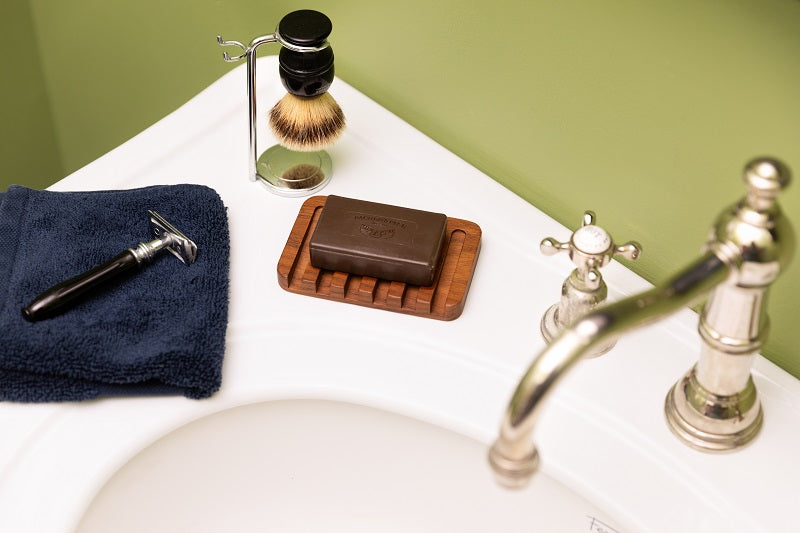What's the Stink? Common Misconceptions About Natural Soaps

All anyone wants is to keep themselves and their families safe, and part of keeping safe is keeping clean and hygienic. Choosing a soap that will help you achieve that goal is essential. With so much information online, it's really easy for fake news and misconceptions to start circulating about certain products.
One such product is natural soaps. We're in the business of keeping you clean and healthy, and we want you to have all of the information possible when making a choice for you and your loved ones. So, we decided to bust some common misconceptions about natural soap and let you decide if it's right for you.
Natural soap just doesn't work as well as "real soap."
This is probably one of the most common myths about natural soap. To bust this myth, we have to get our lab coats on and get into the nitty gritty science behind soap.
Soap is made up of a bunch of molecules with two sides. One side really loves water and attaches itself to any water molecule it can find. The other side would rather be with anyone that isn't water, so it connects to the dirt, grime, and oils on your skin. Because the molecules are no longer attached to your skin, the side that loves water hitches a ride and flows right down your drain, taking germs with it.
In short? Soap doesn't kill germs but lifts it off you and flushes it down the drain.
Natural soaps deliver as promised. They loosen bacteria to wash them away. They do exactly the job that soap should.
Now, you may be thinking about the soap aisle of your local store and all of the products that claim to contain antibacterial ingredients made in labs, such as triclosan and triclocarban. Just because these ingredients are tricky to pronounce and not found in natural soaps doesn't mean they are any more effective than natural soaps. In fact, the FDA issued a statement saying that brands could not market these ingredients as any better than other soaps. The reality is they all work the same to remove germs from your body.
Natural soap is unsanitary.
Some people believe that natural soaps, particularly bar soaps, are inherently dirty. They think that when you scrub down with one of these bars, the bacteria from your hands and body transfer to the soap bar and then end up back on you. To be quite frank, this concept is a little counterintuitive. As we explained above, soap attaches to germs and flows down the drain with the water you wash with. This also applies to the soap bar, as the bacteria on the soap bar comes off when it is rinsed under water.
Germs and soap aren't friends; they want to spend as little time together as possible, so bacteria aren't sitting around on your soap bar when not in use.
Natural soap leaves you dry and isn't moisturizing.
Due to the nature of soap stripping oils and dirt away in the cleaning process, it can leave skin feeling dry. But nobody wants dry skin. We want soap that keeps us clean and moist. Some people doubt that any soap—including natural soap—can do both of these jobs.
Traditional commercial soaps often have added ingredients that can harm your skin more than they help it. Oils on our skin tend to get a bad rap, but some oils are actually really important to keeping our skin hydrated. While ingredients like sulfates and parabens help attack dirt and grime, they are overly-stripping. These ingredients help the soap have a sudsy lather that makes it seem like they’re cleaning better than a natural soap. In truth, they clean just the same, but they can leave your skin feeling irritated and looking dry.
Natural soaps have ingredients that are essential to achieving a good clean, but nothing more than what nature intended. Natural soaps can include ingredients that keep your skin from drying out too much, but still do the job of keeping you fresh. One such ingredient is all-natural pine tar, which is great for everyday use because of its ability to clean without drying out your skin.
Natural soaps can't be worth the cost.
Look, we get it. Natural soaps tend to be a bit more expensive than your standard big box store soap. But let's break this down. Natural soaps use body-safe ingredients that you can pronounce, and here at Packers Pine, our soaps are cruelty-free and don't use any sulfates or parabens. Natural soaps are a great choice because they prioritize your health, and paying a bit more for that, at least to us, is worth it.
With so many options on the market, choosing a soap that keeps you clean and treats your skin right can be daunting. Natural soaps deliver on their ability to fight off germs and protect your skin in the process. Investing in your skin is worth the price.



